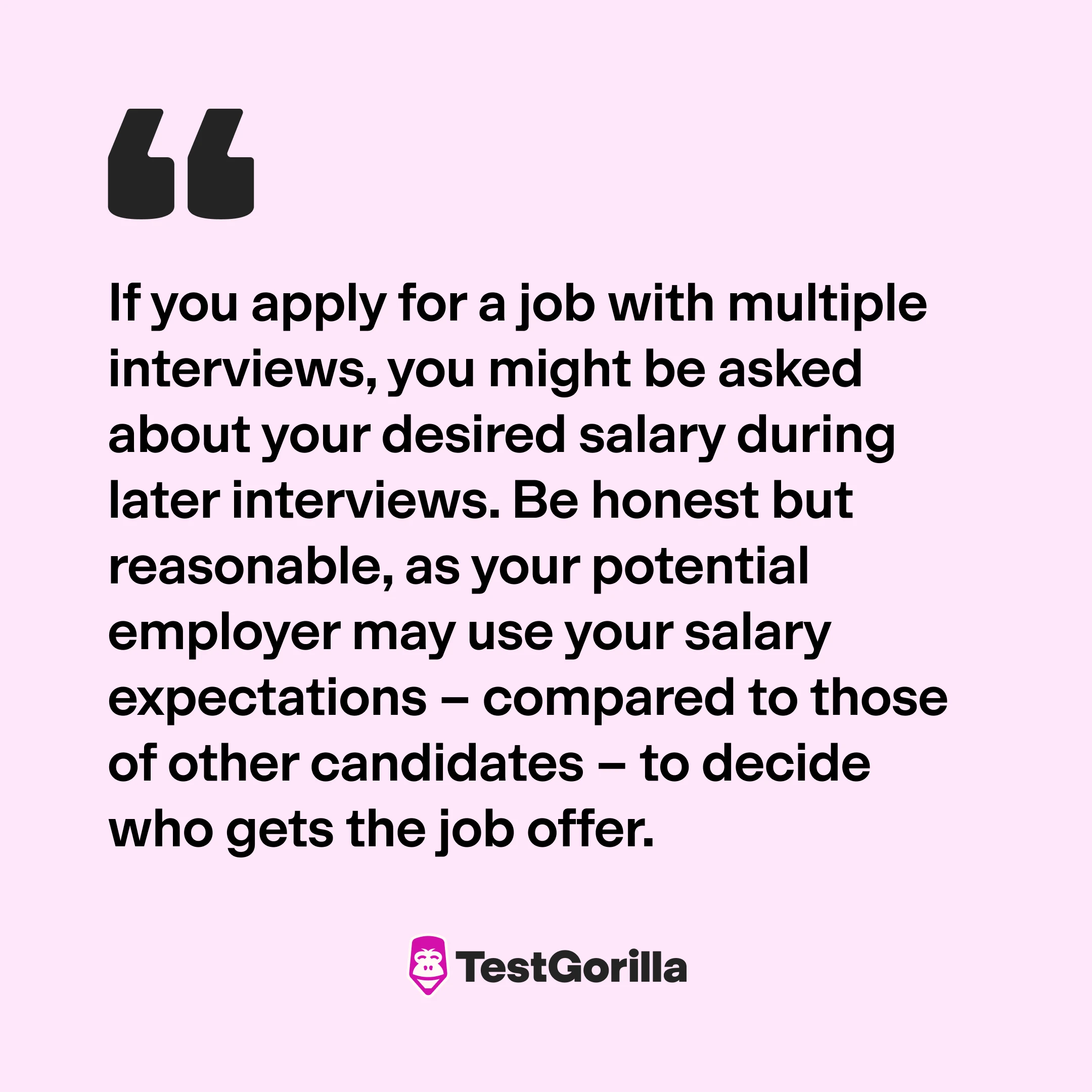There can be so much pressure when a prospective employer asks for your desired salary. You don’t want to sell yourself short or come off as out of touch with realistic expectations.
And if you're unprepared, it's easy to stumble and make costly mistakes – like ignoring employee benefits and perks or coming on too strong during the interview.
Don’t worry. We’re here to explain the details of salary negotiations and help you set expectations for the compensation you deserve. We also share some common mistakes to avoid once you start talking dollars and cents.
What is desired salary?
Desired salary refers to the amount of money you hope to earn in a new job. When employers ask about your desired salary, they're trying to figure out what kind of pay you're looking for and if it aligns with their budget for the role.
It’s not your dream salary. Your ideal number must be realistic and based on the skills and knowledge you can bring to the organization you’re hoping to work for.
Are you a job seeker?
Visit our job seeker hub to get help with your assessment, find your dream job and more.
How to figure out your desired salary
Here are the steps you can take to determine your desired salary.
1. Research industry standards
Start by researching what professionals in your industry and location typically earn. Websites like Glassdoor and PayScale offer salary ranges for similar positions. Look for data specific to your geographic area, as salaries can vary widely depending on where you live.
If you have connections in your industry, consider reaching out for insight into their current compensation. Just keep in mind that not everyone may feel comfortable sharing that information.
That’s why forums like Reddit are great. Users dish out all kinds of details about their pay and work setups – and some even reveal which employers offer the big bucks (for example, check on this subreddit on programming wages).
2. Know your worth
Consider the skills, experience, and qualifications you bring to the table and how they stack up in the job market. Ask yourself:
Do you have any specialized training or certifications that set you apart?
Have you gained unique expertise through previous roles or projects?
Are there specific accomplishments or achievements you're particularly proud of?
Answer “yes” to any of these questions? Then your desired salary should reflect this. For example, your specialized training in cloud security might just demand a higher salary.
3. See what’s being offered
Already planning to apply for a specific job? See if the company includes a salary or salary range in the job description. If you can be picky, consider applying only for companies that offer transparent pay in their job listings.
Candidates often go through the hiring process just to learn that the salary is far lower than they expect. That’s what happened to software engineer Nikolay. Knowing a job’s salary right from the get-go can make it much easier to figure out your salary expectations.
Pro tip: Consider using job boards that require employers to list transparent pay – like TestGorilla’s job board.
4. Factor in benefits and perks
Remember, compensation isn't just about salary. Consider other aspects of the job offer, such as health benefits, retirement plans, bonuses, and potential for career growth.
And don’t forget about cultural perks. A fun, engaging, and flexible work culture might be worth less pay. Some jobs have perks like giving you unlimited time off or letting you bring your furry friend to work. If the salary isn’t as high as it would be for a regular office gig, do the perks make up for it?
The best insights on HR and recruitment, delivered to your inbox.
Biweekly updates. No spam. Unsubscribe any time.
How to negotiate your desired salary at each stage of the hiring process
How you negotiate your salary will depend on the stage of the hiring process you’re in. Let’s explore each stage.
What to put for desired salary on your application
Some organizations ask for your desired salary on the job application. And, unfortunately, many candidates don’t know how to answer salary expectations in their applications.
Try to offer a salary range that shows you’re flexible and have a good understanding of the job market.
Keep a number realistic if you need to input one. Or, try entering “negotiable” or "market rate" to show you're open to discussion.
If the number you enter is too high, some employers may not even consider your application – even if you tick all the right boxes.
How to discuss salary when you’re in the interview
You likely won’t have to dive headfirst into a full-blown salary negotiation during the initial interview – especially if you're chatting with a recruiter. Common interview questions don’t usually include “What’s your desired salary?” But you should be prepared just in case the interviewer brings it up.
If you’re uncertain whether you’ve formally entered into a salary negotiation, politely ask your interviewer – for example, “Since you mentioned salary, are you comfortable discussing my desired salary at this stage, or would you prefer to wait?” If you get the green light, discuss your desired salary range. Now’s also a great time to ask for specifics about those non-salary benefits and cultural perks.
Just remember, timing is everything. Don’t talk salary during the first interview if the interviewer doesn’t bring it up. If you start digging into salary terms before your interviewer is ready, you risk jeopardizing your chances.
Pro tip:
If you apply for a job with multiple interviews, you might be asked about your desired salary during later interviews. Be honest but reasonable, as your potential employer may use your salary expectations – compared to those of other candidates – to decide who gets the job offer. You might not be able to negotiate a higher number later if you go too low now, but if you go too high, they might move forward with someone else.
How to have a job offer salary negotiation
Congratulations on landing the offer! Now it's time to put your negotiation skills into action.
Express your gratitude and enthusiasm for the opportunity. Then, gently steer the conversation toward negotiation points – such as salary or benefits – while remaining open to discussion.
For example, you might say something like, "I'm thrilled about the offer and eager to join the team. While I appreciate the initial salary offer, I was hoping we could discuss the possibility of [insert specific negotiation point, such as salary increase, signing bonus, or additional vacation days]."
Then, provide clear reasons to support your request, like your relevant experience or industry standards. Think about your tone here – keep it friendly and upbeat. If you're chatting face to face, make sure to keep that eye contact going. And don't stress if they throw a counteroffer your way.
If you’re not prepared to accept or rebut the counteroffer, ask for some time to mull it over. Rushing into a decision can lead to regrets, so take your time. But don’t keep them waiting too long (one to three business days is fine).
By finding that sweet spot between being flexible and standing your ground, you'll glide through the negotiation and improve your chances of getting suitable terms.
Pro tip: Don’t be surprised if your job offer salary negotiation happens over the phone or email, especially if the position is hybrid or fully remote. Always stay flexible yet confident – no matter the medium. In fact, you might feel more comfortable countering a salary offer through email – even if the offer happened face to face. This approach is just fine if you’re professional about it.
Tips for negotiating
Your prospective employer may not want to say yes to everything, and that’s okay. But now’s the time for you to really make your case for your desired salary. Here are three strategies to try.
Highlight your unique achievements: Remember those standout accomplishments and areas of expertise? Mention them. These can help justify your value and make a stronger case for the compensation you're seeking.
Address weaknesses in the compensation package: You might point out areas where the offer may fall short compared to competitors. For instance, if the healthcare coverage isn't stellar, you might mention this to negotiate for a higher salary or other perks.
Be mindful of other offers: While it's a bit tricky, mentioning another job offer with a more competitive salary can sometimes work in your favor. Just tread carefully and use this only as a last resort.
The key is to keep the conversation going even if you encounter pushback. Stay composed, justify your requests, and aim for a collaborative solution that works for both parties.
Common salary discussion mistakes to avoid
Talking about salary can be awkward, but you should avoid these common mistakes so you can get the pay you deserve.
1. Not advocating for yourself
Many people shy away from negotiating their salary for fear of appearing greedy or confrontational. However, advocating for fair compensation is a normal and expected part of the hiring process. Don't sell yourself short by accepting the first offer without discussion. Be prepared to discuss your potential contributions to the organization, and advocate for a salary that reflects your worth.
2. Overlooking company culture and values
Focusing solely on the salary at a company with a toxic work environment or values that don't align with yours could lead to long-term dissatisfaction. Consider the overall workplace environment, company mission, and values during salary negotiations to ensure you're choosing a workplace where you'll be happy and fulfilled.
3. Focusing too much on past salary
Don’t focus only on previous earnings when determining your desired salary. You might not have been paid enough in your last job – or you might have been overpaid.
Consider factors like inflation, the cost of living in your area, and the additional skills or experience you’ve gained since your last job. These can all impact your value in the current job market and help you determine a fair and realistic salary expectation.
4. Not keeping it professional
Remember, salary discussions aren’t personal. Yes, your compensation and benefits have a huge impact on your personal life – but don't let emotions take the wheel. Avoid making ultimatums or getting defensive if the negotiation doesn't pan out as expected. This could lead to burned bridges.
If it’s clear that a prospective employer can’t pay you what you’re worth, politely decline the offer and move on to the next.
Find a job with your desired salary using TestGorilla
Now that you know what to put for your desired salary on a job application and during negotiations, it’s time to catch employers’ attention.
TestGorilla’s got you covered. With our job board, candidates can apply for remote jobs by completing talent assessments instead of wasting time on resumes. All the open jobs have transparent salary ranges – so you can figure out if a job is right for you. Want to apply for high-paying remote jobs only? Our job board makes this easy.
Employers assess your skills using objective, bias-free scoring, so there’s no need to hype yourself up – just let your abilities shine through.
To learn more, check out our test library or visit the job board today.
You've scrolled this far
Why not try TestGorilla for free, and see what happens when you put skills first.





















